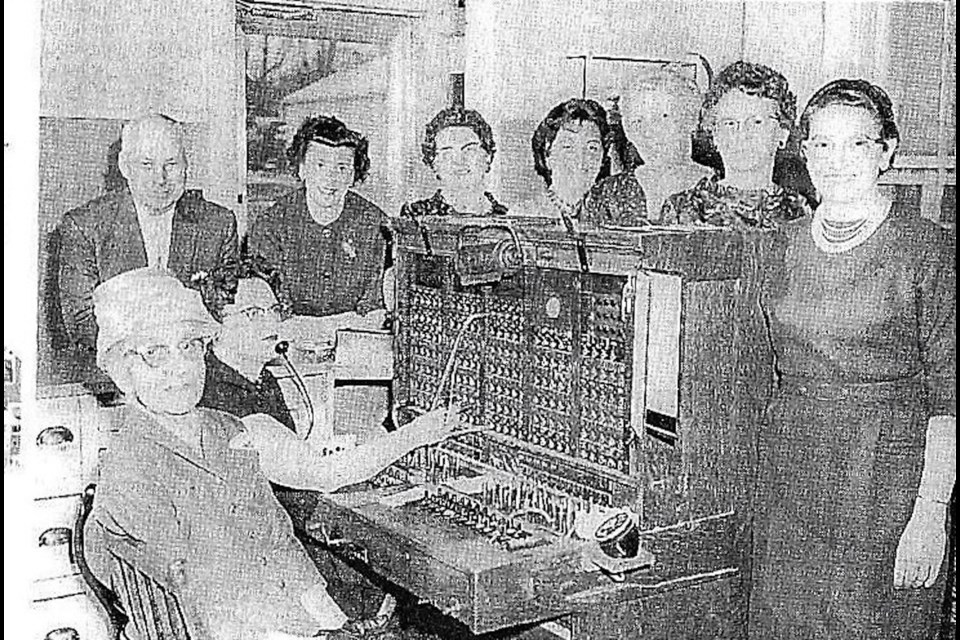Gone are the days of using the wooden box hanging on the wall with its daffodil-shaped mouthpiece and earpiece to make a telephone call. The little ledge for writing messages. A telephone directory hanging on the side. Press the button on the left side and crank the handle on the right. This would ring Central Office. Bells would signal the operator and the voice on the other end of the line awaiting the number you wished to reach.
Operator, number please
The earlier Central Offices were located in general stores or sometimes in small post offices and manned 24/7 by the owners of the business premises. In Shakespeare, Ont., the first phone services were located in one of the general stores owned and operated by Sol Capling.
Eventually, in 1947 the central office was moved to its new building.
Several ladies worked as operators on different shifts to cover 24 hours a day. Children and nieces of some of the operators said they slept in the telephone office while their mothers or aunt worked the night shift.
A resident of Shakespeare Mrs, Neva Cormick left school and worked as an operator handling all incoming and outgoing telephone calls for several years. Beacon Herald She recalled when the Stratford Shakespearean Festival first opened its doors she received frequent calls asking to book tickets to attend such plays. Other operators in Shakespeare were Marj Stock, Alice Habel, Agnes Lotz, Jean Holmes, Leit Noble, and Marcella Oehm to name a few.
In larger areas such as Stratford, telephone service was introduced in the late 1890s due to the fact there was hydropower available in the city.
Teenage boys were originally hired as operators, but they proved to be “too rambunctious" and this led to the hiring of single young ladies.
Many businesses in the city took advantage of telephone service. If you called Perth Brewery you could have 12 bottles of beer delivered by horse and buggy to your house for $1 (equivalent to 35 dollars today).
Stratford was home to the School of Nursing with many young ladies as well. Young men were known to stand outside both establishments to meet the “girl of their dreams” or just to meet "girls". If you need a babysitter, families would call either the operators or the nurses' residence to arrange for a young lady to fulfill their requests. It was a very common occurrence and worked well as a second income for them.
Long-distance calls could be made if there was availability on the trunk line. Only so many calls could be completed at a time. Too many requests and not enough technology to process the calls required you to have the operator “call you back” when it could be routed. The rates for long-distance calls are based on how many miles there were between your location and the location of the receiving person.
Area codes were introduced in 1947
No calls could be dialled directly, as all calls had to be routed through the Operator. They seemed to know everything as to a person’s whereabouts. I am not saying they listened to customers' conversations but they certainly were able to. Some customers would call and tell them where they could be reached or simply give a message to someone who was calling them. The processing of calls would alert them to the goings and comings of people. "Operator – number please." Hello, could you dial 102-J, please? "Is this Nancy?" Yes. "Your mom is over at Mabel's do you want me to call there?"
If you were one of the privileged few who could afford a separate line, you were very fortunate.
If there were more than one customer on a party line you would have to know your call coming in by the number of rings that you heard. One long and two short, three long, and so forth.
Some of us were on a party line with only two customers sharing the line. Wonderful as long as the sharing party was not long-winded or a busybody who could and would listen in on your calls. They had no qualms about sharing any private details.
If you were located in a rural area you would be paired with up to eight other customers or more. Best practices on how to use a party line were included in your telephone directory. Photo This however was not heeded all the time. You had to lift the receiver to make certain no one else was talking before you could call the central office. Sometimes, it would be hours before the line was free. If you had nothing better to do, you could listen to the conversation taking place (conference calls at their finest). Once in a while, you may have an emergency call to make and you had to ask those speaking to end their conversation so you could complete your call.
These operators were always in demand and were always there when you needed them.


